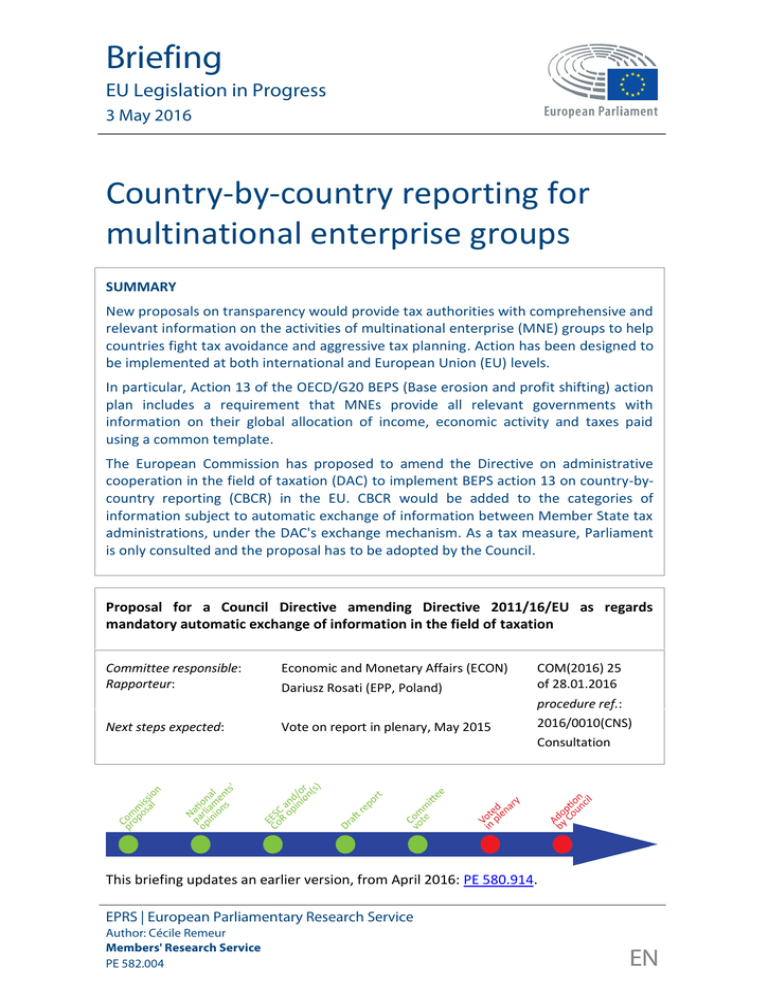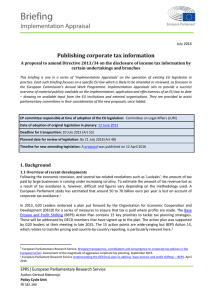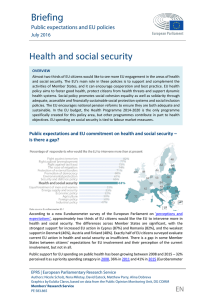Briefing European Parliamentary Research Service
Anuncio

Briefing EU Legislation in Progress 3 May 2016 Country-by-country reporting for multinational enterprise groups SUMMARY New proposals on transparency would provide tax authorities with comprehensive and relevant information on the activities of multinational enterprise (MNE) groups to help countries fight tax avoidance and aggressive tax planning. Action has been designed to be implemented at both international and European Union (EU) levels. In particular, Action 13 of the OECD/G20 BEPS (Base erosion and profit shifting) action plan includes a requirement that MNEs provide all relevant governments with information on their global allocation of income, economic activity and taxes paid using a common template. The European Commission has proposed to amend the Directive on administrative cooperation in the field of taxation (DAC) to implement BEPS action 13 on country-bycountry reporting (CBCR) in the EU. CBCR would be added to the categories of information subject to automatic exchange of information between Member State tax administrations, under the DAC's exchange mechanism. As a tax measure, Parliament is only consulted and the proposal has to be adopted by the Council. Proposal for a Council Directive amending Directive 2011/16/EU as regards mandatory automatic exchange of information in the field of taxation Committee responsible: Rapporteur: Economic and Monetary Affairs (ECON) Dariusz Rosati (EPP, Poland) Next steps expected: Vote on report in plenary, May 2015 COM(2016) 25 of 28.01.2016 procedure ref.: 2016/0010(CNS) Consultation This briefing updates an earlier version, from April 2016: PE 580.914. EPRS | European Parliamentary Research Service Author: Cécile Remeur Members' Research Service PE 582.004 EN Country-by-country reporting EPRS In this briefing: Introduction Context Existing situation The changes the proposal would bring Preparation of the proposal Parliament's starting position Stakeholders' views Advisory committees Council National parliaments Parliamentary analysis Legislative process References Introduction Addressing the need to advance in the fight against tax avoidance and aggressive tax planning, new transparency requirements have been developed in order to provide tax authorities with comprehensive and relevant information on the activities of multinational enterprise (MNE) Groups. The size and structure of MNEs means that they each operate – and thus report on – businesses in several countries. Information on a country-by-country basis is considered an essential tool to counter-act aggressive corporate tax avoidance. Actions have been defined at both international and EU levels. Context The OECD/G20 15-point action plan to address Base erosion and profit shifting (BEPS) has three main pillars: creating more consistency in national tax rules that affect crossborder activities; strengthening substance requirements1 in existing international standards; and improving certainty and transparency. Final reports were agreed in October 2015, with BEPS actions decided by consensus among the participating countries (OECD and G20 countries). They were designed to be implemented in domestic law and practices, as well as through changes in the provisions of relevant treaties. The current proposal relates to BEPS action 13, entitled 'Transfer Pricing Documentation and Country-by-Country Reporting.' Action 132 is based on the OECD's work on Transfer Pricing Documentation.3 The action provides that MNEs provide all relevant governments with information on their global allocation of income, economic activity and taxes paid to different countries using a common template (including both the level of income and number of employees present in a country for instance). This can highlight discrepancies which might signal a problem. The country-by-country (CBC) report is intended to be an assessment tool for high risks and not the basis for proposing transfer-pricing adjustments. The CBC report has a three-tier design: a master file provides a high-level overview of an MNE's global operations and transfer-pricing policies, and is provided to the tax administrations of all the countries concerned; a local file covers detailed information concerning specific inter-company transactions; and a separate country-by-country report, based on a common template, gives all countries a broad picture of how a company operated, including aggregate information on income, taxes paid, total employment, retained earnings and tangible assets in each jurisdiction. MNEs should file CBC reports as of the fiscal years starting on or after 1 January 2016; they would be required to file them within 12 months of the end of the relevant fiscal year.4 Members' Research Service Page 2 of 6 EPRS Country-by-country reporting As regards the size of MNEs (materiality threshold), there would be an exemption from the general filing requirement for MNE groups with annual consolidated revenue in the immediate preceding fiscal year of less than €750 million (or near-equivalent amount in domestic currency). This will exclude approximately 85 to 90% of MNE groups, while still covering 90% of corporate revenues. A review of this threshold is set for 2020. No further exemption should be adopted (e.g. exemptions excluding certain sectors or industries). The ultimate parent of the group that meets the revenue threshold will be required to file the CBC report in its home-state jurisdiction. The latter would automatically exchange the information with other countries in which the MNE group operates (governmentto-government mechanisms). If a country fails to do so, a secondary mechanism is in place through local filing, or through filing of the country-by-country reports by a designated member of the MNE group acting in place of the ultimate parent entity.5 Countries6 participating in the BEPS project have agreed to develop an implementing package, which includes in particular key elements of the domestic legislation to require CBC reports. In addition, they have endorsed implementing arrangements for the automatic exchange of information (agreements between the competent authorities based on the Multilateral convention on mutual administrative assistance in tax matters, bilateral tax treaties and Tax Information Exchange Agreements or TIEAS). The agreement covers the conditions underpinning obtaining and using CBC reports. Protection of confidentiality (including limitation of use, and rules on persons to whom the information may be disclosed), consistency (with the standard template contained in the OECD transfer-pricing guidelines) and appropriate use (i.e. for assessing transferpricing risks, to which is added the possibility to use them for assessing BEPS-related risks). Possible uses do not include adjustment of income on the basis of those reports. Existing situation Council Directive 2011/16/EU concerning administrative cooperation in the field of taxation (referred to as DAC1) defines the necessary procedures for better cooperation between tax administrations. It replaces the 1977 Directive on mutual assistance (77/799/EEC). The DAC provides for the exchange of information in three cases: spontaneous, automatic and on request. It establishes mechanisms for the participation of Member States' authorities in administrative enquiries, and simultaneous controls and mutual notifications of tax decisions. It also provides for the necessary practical tools, such as a secure electronic system for information exchange. The DAC has so far undergone two revisions, respectively in 2014 and 2015. The first revision (Council Directive 2014/107/EU), adopted on 9 December 2014, amended the DAC as regards mandatory automatic exchange of information in the field of taxation, aligning EU law with the AEOI (automatic exchange of information) global standard (DAC2). The second revision (Council Directive (EU) 2015/2376) was adopted on 8 December 2015, and amended the DAC to extend the mandatory automatic exchange of information to rulings and advance-pricing arrangements (DAC3). An implementation appraisal prepared by EPRS provides a succinct overview of material publicly available on the implementation of automatic exchange of information. The changes the proposal would bring The proposal for a directive amending the DAC as regards mandatory automatic exchange of information in the field of taxation will be the third amendment to that directive. As a result, it will be the fourth 'version', which leads some to call it DAC4. Members' Research Service Page 3 of 6 EPRS Country-by-country reporting EU-level implementation of BEPS Action 13 on CBCR will be put in place through amendments to the DAC. CBCR would be included within the DAC, which already provides for exchange mechanisms. The amendments include reports on corporations' financial results in the categories of information subject to automatic exchange of information between Member State tax administrations, by inserting a new article 8aa on the 'Scope and conditions of mandatory automatic exchange of information on country-by-country reports'. The amendments primarily cover 'the ultimate Parent Entity of an MNE Group that is resident for tax purposes' in the territory of a Member State, or the 'reporting entity' defined in section II of the added Annex III on 'Filing rules for Groups of multinational enterprises'. The proposal applies the material threshold defined in BEPS Action 13 (that is, €750 million) and provides that the measures will apply first for the fiscal year of the MNE group that starts on or after 1 January 2016. The automatic exchange of information on country-by-country reporting will use a standard form in the Annex added to the DAC, and will be transmitted through the Common Communication Network (CCN). The European Commission will assess each year in the future the effectiveness of theses mechanisms. Penalties are set for infringing the national provisions transposing the directive. In the proposal, the implementation deadline for Member States is set for 31 December 2016 at the latest, with the Member States applying the provisions from 1 January 2017. Preparation of the proposal The proposal was prepared with the development of the BEPS action plan. It was announced in the Transparency action plan adopted by the Commission in March 2015. Parliament's starting position The Special Committee on tax rulings (and other measures similar in nature or effect) (TAXE 1), set up on 12 February 2015 in the wake of the 'Luxleaks' revelations, prepared a report adopted in plenary on 25 November 2015. With regard to tax transparency, it identified measures needed to address corporate tax-base erosion and revenue losses, both in the EU and in developing countries. These measures cover increased transparency through systematic sharing of rulings and tax information likely to have an impact on other Member States, providing tax authorities with sufficient resources, as well as informing the Commission and public country-by-country reporting (CBCR) by MNEs of profits made, taxes paid and subsidies received. The Economic and Monetary Affairs Committee (ECON) prepared a legislative owninitiative report on 'Bringing transparency, coordination and convergence to Corporate Tax policies in the Union', adopted in plenary on 16 December 2015. On country-bycountry reporting, it recommended mandatory, public country-by-country reporting for all sectors by MNEs, based on the BEPS Action 13 requirements. The report took into account the results of the Commission's consultation into CBCR, conducted between 17 June and 9 September 2015, which examined different options for the possible implementation of CBCR in the Union, as well as the proposals for full public CBCR outlined in the revised Shareholder Rights Directive. 7 Stakeholders' views Stakeholders hold differing views. Some insist on confidential country-by-country reporting and the protection of commercially sensitive information, in line with the Members' Research Service Page 4 of 6 EPRS Country-by-country reporting OECD's CBCR provisions; they also stress the need to prevent additional and excessive bureaucracy and to streamline reporting requirements. However, some commentators see the proposal as only a first step towards a public and broader CBCR, given that the material threshold excludes all but a limited number of multinationals (assessed as between 10-15% of the total). The range of opinions is apparent from the summary of the responses (20 January 2016) to the public consultation by the Commission Directorate-General Financial Services, Stability & Capital Markets Union) (DG FISMA). Advisory committees The European Economic and Social Committee adopted an opinion on 28 April 2016. Council The proposal, received by the Council of the European Union on 28 January 2016, was discussed at working-party level in February 2016, and subsequently referred to Coreper in March 2016.8 Based on the preparatory work, the Ecofin Council decided on a general approach to the proposal, inserting country-by-country reporting to tax administrations by amending the Directive on Administrative Cooperation, on 8 March 2016. The general approach is in line with the proposal, with amendments to the recitals and the annex added to the DAC, entitled 'Filing rules for Groups of multinational enterprises'.9 The position insisted on the need to protect data by not publishing them, providing that they are communicated to tax administrations (Germany and Malta). An added recital states that 'the information exchanged under (the) directive does not lead to the disclosure of confidential, industrial or professional secret, or of a commercial process, or of information whose disclosure would be contrary to public policy.' National parliaments The deadline for national parliaments to submit comments on the proposal was 30 March 2016. Three chambers had forwarded a position by the deadline. One of them (the Swedish Parliament) decided to adopt a reasoned opinion. Legislative process The European Parliament's Committee on Economic and Monetary Affairs adopted its report (rapporteur: Dariusz Rosati, EPP, Poland) on 26 April 2016. The amendments call in particular for: the Commission to have access to the information exchanged, whereas the proposal provides for exchanges between tax authorities only. The Commission's involvement aims at assessing compliance with EU competition and state aid rules, since state aid provisions may apply to unfair tax practices in the field of corporate taxation, the Commission to be responsible for the central register of country-by-country reports available to competent services, and to publish a report on that basis with due care to confidentiality, and the Commission to inform the Council and Parliament of the Member States' assessment of the effectiveness of the automatic exchange mechanism (which should cover cases where full reports have not been filed or exchanged), as well as review the effectiveness of the directive within three years of its entry into force (review clause). Members' Research Service Page 5 of 6 EPRS Country-by-country reporting The amendments also reiterate that: MNEs' corporate tax avoidance disadvantages other companies, in particular small and medium-sized enterprises, fighting against corporate tax avoidance requires sufficient resources, the EU mechanism is placed in the perspective of the OECD's Multilateral Competent Authority Agreement (MCAA) for the automatic exchange of CBCR, it is important to design taxes in a way that they does not impair growth and investment, and minimises costs and administrative burdens of companies, the mechanism could act as an incentive for MNEs to abandon certain practices, and there is a need for adequate resources to be dedicated to the exchange of information and to data processing. References Taxation: scope of the mandatory automatic exchange of information in the EU, European Parliament, Legislative Observatory (OEIL). Transfer Pricing Documentation and Country-by-Country Reporting, Action 13 - 2015 Final Report and Action 13: Country-by-Country Reporting Implementation Package, OECD. Endnotes 1 Substance (economic or tax) refers to the actual economic activities of a company, typically assessed through its personnel, its functions and the risks it undertakes, as well as the key assets. 2 Discussions, as well as a public consultation, took place in 2014 and 2015. 3 The July 2013 OECD White Paper and revised guidance on transfer-pricing documentation of the OECD Transferpricing Guidelines defined a two-tier approach (a master file with comprehensive information about the global operations of an MNE and standardised information on all MNE group members; and a local file, with transactional information relevant to each country, that supplements the master file). 4 Defined in the 'Implementation package' as 'The term “Reporting Fiscal Year” means that Fiscal Year the financial and operational results of which are reflected in the country-by-country report defined in Article 4.' 5 Transfer-pricing Documentation and Country-by-Country Reporting – Action 13: 2015 Final Report, OECD, 2015, p. 25. 6 As for the EU, 21 of its Member States are OECD members and the EU itself is part of the G20. 7 As voted for by the European Parliament on 8 July 2015 and the outcome of the ongoing trilogues on this Directive. 8 See Council documents 6672/16, of 3 March 2016, and 6949/16, of 15 March 2016, available in the Council register. 9 A consultation on public CBCR has been organised. On 12 April 2016, the Commission made a proposal for a directive which imposes on EU and non-EU multinational groups the requirement to publish a yearly report on their profits and tax paid and other information, with reference 2016/0107(COD). Disclaimer and Copyright The content of this document is the sole responsibility of the author and any opinions expressed therein do not necessarily represent the official position of the European Parliament. It is addressed to the Members and staff of the EP for their parliamentary work. Reproduction and translation for noncommercial purposes are authorised, provided the source is acknowledged and the European Parliament is given prior notice and sent a copy. © European Union, 2016. [email protected] http://www.eprs.ep.parl.union.eu (intranet) http://www.europarl.europa.eu/thinktank (internet) http://epthinktank.eu (blog) Members' Research Service Page 6 of 6






